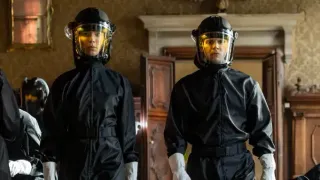
Jul 22
Pee-wee's bike is at the Alamo, but not where you think
Andrew Demillo READ TIME: 2 MIN.
It took 40 years, but Pee-wee's bike is now at the Alamo. Just not the basement.
The Alamo announced last week it had acquired and would display the iconic bike from the 1985 Tim Burton film, “Pee-wee's Big Adventure.”
The San Antonio landmark plays a key role in the film chronicling Pee-wee Herman's search for his stolen bicycle when a devious fortuneteller tells him the bike is located in the Alamo's basement. Pee-wee, played by the late Paul Reubens, learns the Alamo doesn't have a basement, but hasn't stopped tourists from tongue-in-cheek inquiries.
“It's the most common question our guest services team hears is, ‘Where is the basement at the Alamo?'” said Jonathan Huhn, senior communications director for the Alamo Trust, Inc., the nonprofit organization that oversees the Alamo's operations. “It's an iconic piece of Alamo pop-culture history.”
The red-and-white bike — or as Pee-wee calls it in the movie, “the best bike in the whole world" — is adorned with streamers on the handlebars and a lion emblem at the front. Huhn said it was acquired from an auction in Los Angeles.
The bike will serve as a centerpiece in the Mays Family Legacy Gallery, which examines the the Alamo’s cultural impact, part of a new visitor center and museum slated to open in fall 2027. It will join other pop culture items including memorabilia from the 1960 movie about the Alamo that starred John Wayne.
“It's really a pop culture bridge" that will bring people to learn about the Alamo's history, Huhn said.
But before then, the bike will go on display for a limited time at the Ralston Family Collections Center. The Alamo also plans to host a free public screening of “Pee-wee's Big Adventure” in Plaza de Valero. More details about dates for the display and the screening will be released later.
Unlike the Alamo, the building where Pee-wee's bike will eventually be located does have a basement. But, before you ask, that's not where the bike will be.






